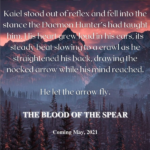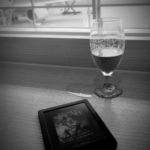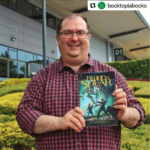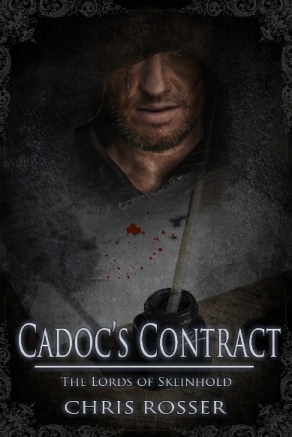
Cadoc’s Contract
The Lords of Skeinhold
By Chris Rosser
A warrior returns home from a holy war, burdened by a blood debt to the gods. With the world he left behind in tatters, he must reconcile his role in his family’s undoing.
A warrior returns home from a holy war, burdened by a blood debt to the gods. With the world he left behind in tatters, he must reconcile his role in his family’s undoing.
Cadoc wanted more than the life of a simple farmer. So, when Artur, Duke of Kas Mendoc raised his banner, Cadoc answered the call, marching south to enlist in a great crusade against the Oskoi. He travels to a distant land and carves his name in the bodies of the dead.
Yet Cadoc has a secret, a contract made with the gods to give him the strength he needs to survive this bloody war. One hundred souls — a debt of blood to a hungry god. But disaster strikes and Cadoc flees for his life. Can he face the men he left behind and account for those he killed? Has he paid his debt, or was his soul part of the price?
Just released, Cadoc’s Contract is the second novella by Chris Rosser set in the Skeinhold series, and another masterful tale by a burgeoning new voice in the Aussie spec-fic scene.
I met Chris online via a mutual friend who told me he had another friend who also wrote fantasy. That friend was Chris. So I checked out the first novella Chris has released (Mistress of Skienhold) and followed him on twitter. Chris is quite sociable and likes to get to know the people who follow him, so he started chatting, and I chatted back, and the rest is history.
I thought I’d ask Chris if he’d like to do an interview, answering ten (terrifying!) questions, in support of the release of Cadoc’s Contract. He said yes!
So, sit back, relax, grab a coffee, a tea, a water – or even something stronger-, and say hello to Chris Rosser.
To begin with why don’t you tell us a little bit about yourself – where were you born? Raised? Schooled?
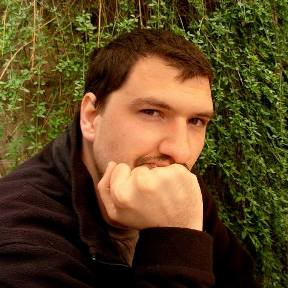
I’m originally from the Wales in the United Kingdom. I migrated to Australia in the mid-80s with my family. After a brief stop in Melbourne’s western suburbs I moved out to Bacchus Marsh, where I finished the rest of my primary and secondary schooling. Bacchus Marsh oddly enough produced another great Australian writer — Peter Carey. After finishing school, I stud-ied History and Archaeology at Melbourne University, then I went on to compete a Masters of Arts in Editing and Communication.
What started you writing, and is it the same thing that still inspires you today?
I’ve written stories for as long as I can remember, but I first started taking it seriously (at least as a hobby) when I was 15 or 16. Back then I did it for the sheer fun of it. Then when I started sharing them, people said I wasn’t half bad and that I should consider publishing. Like most youngsters, I dreamed of fame and riches and got frustrated when realities set in. So, I became a professional technical writer instead, and the professions been very good to me. Now I’ve happily come full-circle, and I’m back to writing fiction for pleasure and I’m much happier for it.
How many novels/stories did you write before you published?
Far out, I’ve probably written about 15 books in various stages of completion before I published my first in 2018. A couple of them will be resurrected, but they belong to different genres, so I’ve not yet decided how and when I’ll tart those up for publication. Right now I’m focusing on finishing my current fantasy series.
What has your publishing journey been like?
It’s been a long and staggered process if I’m honest. I first tried going the traditional route in 2005-ish and actually managed to find an agent here in Australia that agreed to take me on. Unfortunately for reasons I still don’t understand, she dropped me with nothing more than an irrelevant rant via email. Being young and inexperienced, it was quite a blow to my confidence and I didn’t have the self-belief to try again. I would have dealt with an outright rejection, but to be accepted then dropped… that was rough.
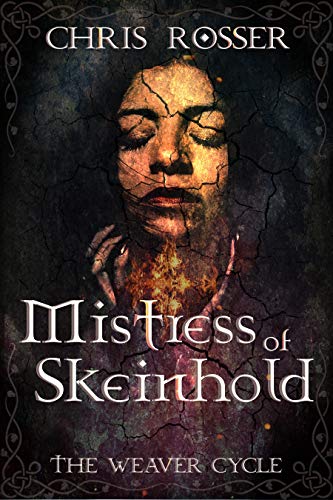
Anyway, not long after, I landed my first professional writing job, then I moved to the UK with my wife to work and travel throughout Europe, and I didn’t write much fiction beyond the occasional tilt at Nanowrimo. Then, as we were coming back to Australia via North America in 2010 the Kindle revolution was gathering momentum, I bought a Barnes&Noble Nook in New York and I began to consider self-publishing. We started a family not long after we got back to Melbourne though, but the idea wouldn’t go away. I slowly started to get back into writing, picking up Nanowrimo and blogging again in 2014. I guess I just fell back in love with writing fiction.
When I published Mistress of Skienhold, it was almost by accident. I mostly wrote it as a means of getting back into my characters and my fantasy setting. But I was invited by someone on Twitter to submit a story to their online magazine. I took a punt with an extract of The Weaver’s Boy, and was accepted. The reception was overwhelmingly positive, and I thought bugger it, I’ll publish the complete story and see what comes!
Please tell us about your novel, Cadoc’s Contract.
You can blame the muse for this one. After I published Mistress of Skienhold last year, I had the sudden inspiration to write the story of how Cadoc became the Lord of Skeinhold. When we meet him, he’s journeying by sea back from a disastrous crusade in which he fought as a mercenary. Like many veterans, he’s tormented by what he did and what he saw. He’s also hiding a dark secret, one that’s going to land him and his family in a lot of hurt.
So, it’s become a prelude to my series, set about 6 years before Mistress of Skienhold. It wasn’t an easy draft to write, but I managed to wrangle it back into shape and I think it turned out to be a terrific story, one that helps to set the tone of the series, along with serving as a decent introduction to my word.
What do you consider the most challenging about writing a novel, or about writing in general?
Geez where to start! Time is probably my biggest issue these days, thanks to juggling a family and a full-time job. Good writing takes a lot of revision, and an obsession with craft — doubly so when you’re an indie author and can’t just boot it off to your editor for umpteen revisions.
One thing I do battle with is the conventions of the genre. Fantasy and fantasy readers have particular expectations, but for me character and story comes first and I challenge every trope I find. That can lead to moments self-doubt and I wonder if I’m scuttling my chances of being read!
Beyond the writing itself, and the biggest drag is publishing and marketing. It’s doubly hard when you’re outside the United States and certain companies either cripple their services for non-US residents or block us outright from accessing them. For an example, I’m about to start narrating my own audiobooks but the biggest distributor ACX (Audible), won’t allow me to do so from Australia.
What is your work schedule like when you’re in writer’s mode?
See above! A lot of my writing time is fuelled by midnight oil, after my kids have gone to sleep. Sometimes I can schedule in a Sunday afternoon, or snatch some time during my commute to and from work. When Nanowrimo comes round, I usually take some annual leave where I can, though I think I’ve outgrown Nano, and won’t be doing it this year.
Do you use an outline when you write, or are you more of a discovery writer?
Ah, the eternal question: to plot or pants! I’ve tried both. Purely pantsing just doesn’t work for me — I tried with Cadoc’s Contract and the original Weaver of Dreams and it took about much longer than it should have. By the same token, I don’t like outlining so much that it spoils the discovery and takes all the fun out of writing. So, these days I get my characters right in my head, and I have a vague outline to plot the story’s direction. That gives my analytical mind the road map it needs, but there’s enough undiscovered territory to intrigue the muse.
How do you balance what you’re reading against what you’re writing?
The honest answer is I don’t. I have so little time as it is, reading is just one of those things that gets pushed to the backburner, particularly when I’m drafting. When I read these days it’s less for pleasure and mostly to review books for my website and newsletter, or to beta-read the works of other authors.
Today, when I consume a book for pleasure, I’m much more likely to listen to an audiobook, and then it’s typically a genre that I don’t write. After 6 years of academic study and 15 years as a professional writer and editor, I find it very hard to switch off my inner critic. When I listen to an audiobook however, I don’t have that problem.
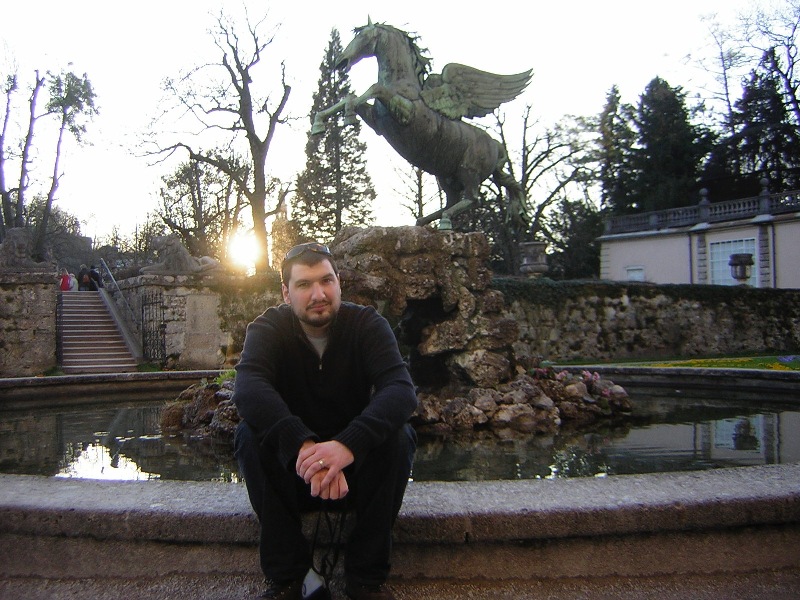
What advice do you give aspiring writers?
Practice, practice, practice…and be realistic. Writing is a difficult craft, and I’d challenge the belief that it comes naturally to anyone. If you look at your first draft and say to yourself, ‘hey this is awesome,’ you are delusional and you lack the self-criticism you need to improve your craft. Leave it for a month and when you revisit your manuscript, you’ll understand.
I’d also encourage new writers not to compare themselves to their favourite author. When you marvel at the skill of your favourite book, you’re seeing a finished product that’s undergone a huge (often collaborative) effort to produce and refine. When I was a masters student, a lecturer noted that one of Peter Carey’s Booker Prize-winning novels had more than 12 thousand editorial corrections. Step out of the shadows, find your voice and believe in your self.
Chris Rosser, thank you!
